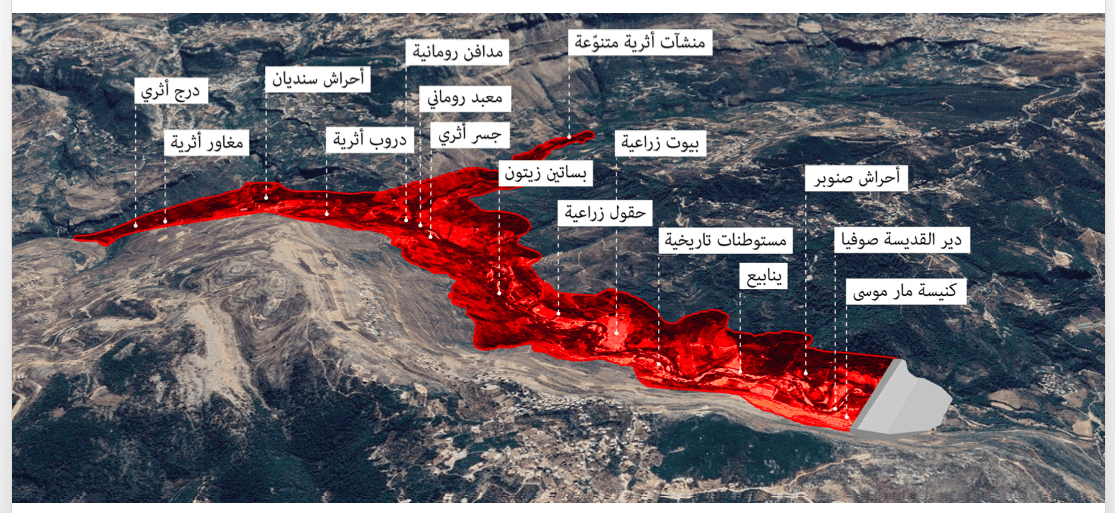Minister of Information Manal Abdel Samad announced the government will resume its plans with the Bisri Dam project “due to its strategic importance in providing needed water to the greater Beirut area.” The announcement came following the Lebanese cabinet’s session on March 2.
The project was initially adopted in 2014 by the cabinet and has been projected as a necessary plan to supply around 1.6 million people in greater Beirut with drinking water. Many local environmental experts and activists expressed their opposition towards the Bsiri Dam, stating the project will impose severe environmental catastrophes.
Activists listed deforestation as one of the major concerns. According to them, a low estimate pinpoints 150,000 woodland trees will be cut for the dam. A higher estimate suggests an “environmental genocide” that could take up to 500,000 trees. Fears of a higher chance of earthquakes are also present because the Bisri Dam site is located atop a highly-active earthquake fault. In addition to that, over 50 archaeological sites will be destroyed by the project.
Most importantly, activists fear further mismanagement and abuse of resources in Lebanon’s water sector. Politicians have used water scarcity as the excuse behind going through with the Bisri Dam project, but the country does not lack in resources.
“Around 70 percent of Beirut’s water is provided from the Jeita Spring, but 40 percent of that water goes to waste before even reaching the capital because of poor maintenance and a rotten waterpipe network that suffers from uncontrolled leakage,” reads a report by Beirut Today.
Read also: The Bisri Damn Project Is A “Ticking Atomic Bomb”
The majority of the $600 million project is funded by the World Bank, which has prompted foreign politicians to object and rally against it. The National Campaign to Protect the Bisri Valley began in 2018, with the cause coming to occupy huge importance in the nationwide uprising.
During the past few months of anti-government protests, several activist groups and individuals camped by the valley where the Dam is located and took to the streets in opposition of the project. After much effort, they managed to stop contractors from resuming their work in the valley.
As Lebanon resumes its lockdown due to the coronavirus pandemic, the government has taken the chance to green light the project. This comes one week after Internal Security Forces took to Downtown Beirut after curfew to tear down the tents and evacuate the remaining protestors from the area.
So last night, interior minister Mohammad Fehmi ordered @LebISF to dismantle by force the October Uprising tents in downtown Beirut. They destroyed the tents with hands & tools, without even a request for their dismantlement by the activists. They arrested those who resisted. pic.twitter.com/rZNYwFcBJo
— Nizar Hassan || نزار حسن (@Nizhsn) March 28, 2020
Just this past February, two German MPs requested that the German government lobby against the controversial project. Both members of Germany’s Green Party, MPs Katrin Goering-Eckart and Uwe Kekertiz, even went so far as to raise the issue with the German Minister for Economic Cooperation Gerd Muller.
They urged Muller to ask Germany’s representative on the World Bank’s Board of Directors questions about the project, which they found to be an example of failed policy in Lebanon.
Later on, an advisor to MP Goering-Eckart told Beirut Today that “the World Bank are so far not willing to reverse their faulty decision.”
The source also noted that the MPs were considering further options to push against the project which the Lebanese people vehemently protested against.
The government, now in severe economic collapse, is expected to seek financial support from Germany and other EU countries for the funding of the project. The German advisor then noted that “our government has no intention to throw more money after a project that is doomed to fail and strengthen corrupt practices in Lebanon even further.”


